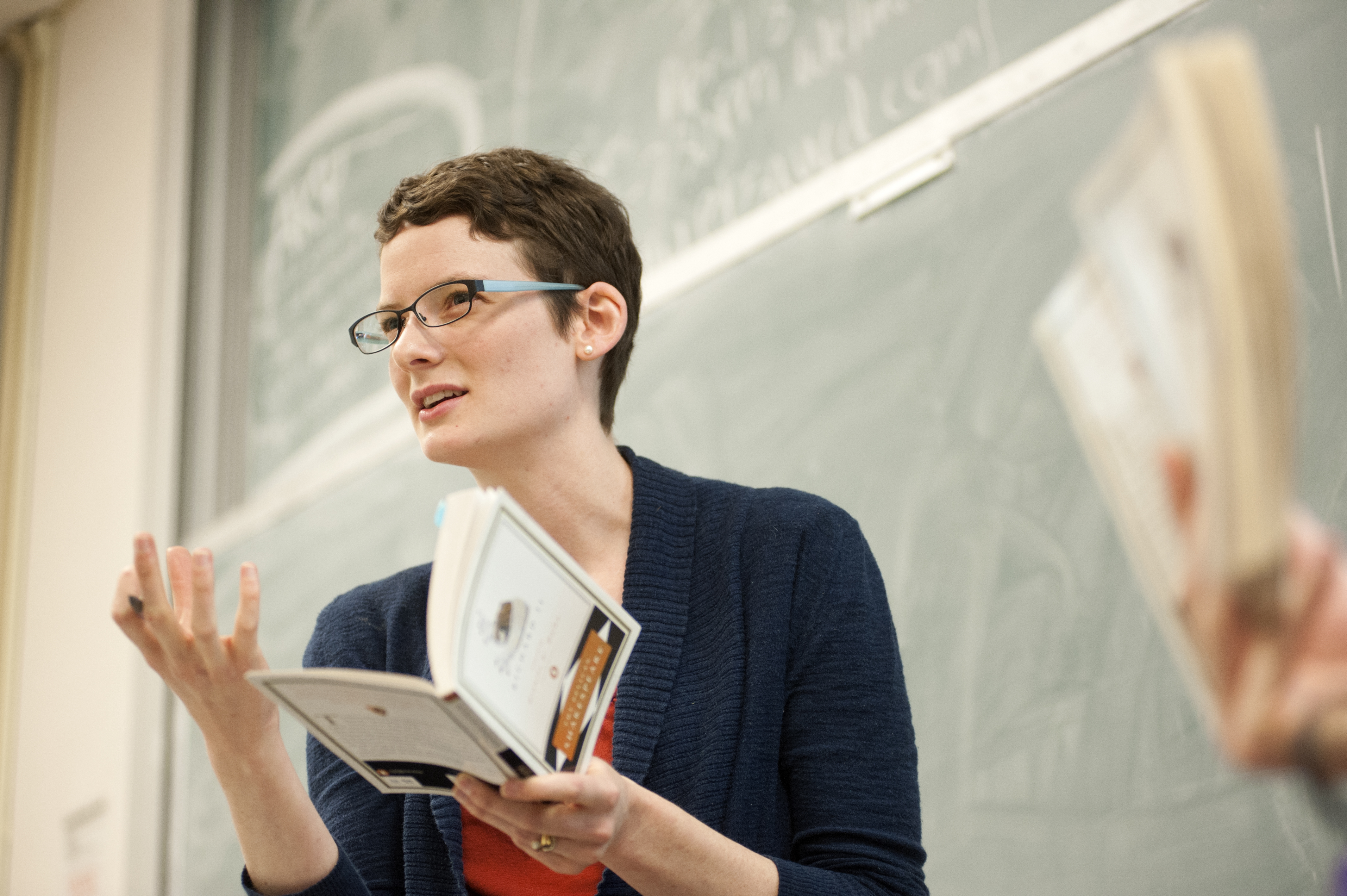Teaching Philosophy

My goal in the classroom is to create lively, productive conversations by inviting students to share and broaden their experiences through close encounters with complex texts. In my summer courses at Skidmore College, high-achieving high school students from under-served communities learned alongside current Skidmore students and adults from the Saratoga community. At UC Davis, I worked with international students, non-native English speakers, parents, students returning to college after other careers, those with disabilities, and those from different racial, economic, and cultural backgrounds. I have continued to teach students from all of these backgrounds, first at Ithaca College and now at Colby College, both of which are majority white and majority young-adult communities; I use collaborative learning practices that I have developed in response to my students and that encourage diverse perspectives in my classrooms.
Close analysis of a broad range of texts forms the core of each of my courses, and we support our close textual work with individual and group research projects. My students’ close readings become a foundation for their work as sophisticated readers and writers, whether they are comparing disparate texts, responding creatively to our readings, gathering evidence to support their claims, or placing their ideas in relation to those of classmates and experts. These skills are central to literary study, and also to students’ engagement as citizens within and beyond college.

Fall 2025 Courses
-
Slow Read Shakespeare: The Tempest: Our goal for the semester will be to slow down with Shakespeare. We will engage in critical reading and re-reading practices and explore how historical research, creative response, adaptation, and place-based study can shape our understanding of Shakespeare’s The Tempest. Along the way, we will find answers to some of these questions: What was Shakespeare reading and where—culturally and spatially—did he write from? Why read Shakespeare, here and now? What can reading slowly teach us about the study of literature and the practice of writing?
-
Foundations of Literary Studies: The central purpose of this course is to introduce you, as per the title, to the foundations of literary studies; that is, our task will be to discuss and practice how to read and write about literature according to the conventions of the academic discipline of literary studies. To approach this task, we will read widely across the various kinds of literature—poetry, essays, a play, and a novel—written in English in time periods from the medieval to the twenty-first century. We will define key disciplinary terms and concepts and put them to use in analytical close readings of our texts. We’ll consider some authoritative answers to the question “What is Literature?” and we’ll attempt some answers of our own. We’ll explore not just how to read literature but also why we might want or need to do so. What does reading literary texts do to you and how? What can you do with literary texts? What does literature enable us to feel, experience, or describe? How do stories shape our interior and exterior worlds?

Spring 2026 Courses
-
Greenworlds and Changeable Bodies in Early Modern Drama: In 16th and 17th century English drama, clothing can make or unmake the (wo)man, bodies and identities are malleable, and greenworlds—forests, rivers, seashores, and battlefields—upend social norms and trouble human/nonhuman boundaries. Students will use a range of ecocritical and sexuality studies theories to explore and write about queer bodies—capaciously defined—in plays including John Lily’s Gallathea, William Shakespeare’s Twelfth Night, Margaret Cavendish’s Love’s Adventures, and John Milton’s Comus: A Mask.
-
Language, Thought, and Writing: Community Literacy and Migration: Where are we and what are we doing here? How did we get here and how do we know what we know? What’s next and who needs to hear our stories? These three sets of questions will guide our exploration of personal essays, literary texts, scholarly criticism, images, and more as we seek to gain literacy—not only the ability to read and write but also to engage cultural knowledge—about Colby College and Waterville, about the communities from which we come, and about the concept of migration. We will examine our arrival in the Colby College community through reflective, analytical, narrative, and research-based writing, peer editing, and other literacy-focused activities. We will place our own stories in relation to those of writers from the past and the present, including Shakespeare, Joy Harjo, Margaret Cavendish, bell hooks, and Mohsin Hamid. Our goal will be to develop a successful college-level writing practice while gaining a textured understanding of what it takes to migrate, what kinds of knowledge we bring with us when we do, and how humans gain literacy and become creators of new knowledge when we join new communities.

Colby College Courses
- Language, Thought, and Writing: Community Literacy and Migration
- Foundations of Literary Studies
- Introduction to Environmental Humanities
- Literature and Environment
- Staging Pirates and Captives in Early Modern Romance
- Shakespeare and Injustice
- Slow Read Shakespeare: The Tempest
- Women, Science, and Politics in 17th C Literature
- Greenworlds and Changeable Bodies in Early Modern Drama
Ithaca College Courses
- Academic Writing I
- Literature and Environment: Vital Rivers, Rivers in Crisis
- Renaissance Literature: Women, Science, and Politics in 17th C Literature
- Introduction to Poetry
- Shakespeare (sophomore level)
Teaching History
- 2015-2021 Lecturer at Ithaca College
- 2009-2015 Associate Instructor at University of California, Davis
- 2008-2009 Teaching Assistant at University of California, Davis
- 2011-2012 Instructor at Skidmore College, Summer Program

